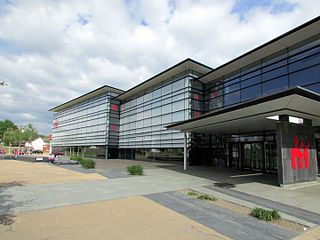
The University of Strathclyde is a public research university located in Glasgow, Scotland. Founded in 1796 as the Andersonian Institute, it is Glasgow's second-oldest university, with the university receiving its royal charter in 1964 as the first technological university in the United Kingdom. It takes its name from the historic Kingdom of Strathclyde.
Biotechnology and Biological Sciences Research Council (BBSRC), part of UK Research and Innovation, is a Non-departmental public body (NDPB), and is the largest UK public funder of non-medical bioscience. It predominantly funds scientific research institutes and university research departments in the UK.
The Engineering Doctorate scheme is a British postgraduate education programme promoted by the UK's Engineering and Physical Sciences Research Council (EPSRC). The programme is undertaken over four years. Students conduct PhD-equivalent research and undertake taught business and technical courses whilst working closely with an industrial sponsor. Successful candidates are awarded the degree of Doctor of Engineering (EngD) and are addressed as doctor.

The National Waterfront Museum, Swansea or NWMS is a museum in Swansea, Wales, forming part of Amgueddfa Cymru – National Museum Wales. It is an Anchor Point of ERIH, The European Route of Industrial Heritage.

The Engineering and Physical Sciences Research Council (EPSRC) is a British Research Council that provides government funding for grants to undertake research and postgraduate degrees in engineering and the physical sciences, mainly to universities in the United Kingdom. The head office is in Swindon, Wiltshire in the same building that houses the AHRC, BBSRC, ESRC, MRC, Natural Environment Research Council, Science and Technology Facilities Council, TSB, Research Councils UK and the UK Space Agency.
The N8 Research Partnership is a partnership created in 2007 of the eight research-intensive universities in Northern England – Durham, Lancaster, Leeds, Liverpool, Manchester, Newcastle, Sheffield and York. The N8 Research Partnership aims to maximise the impact of this research base by identifying and co-ordinating powerful research teams and collaborations across the North of England. Collectively, the N8 universities undertake more than £650 million of research income per annum and employ over 18,000 academic staff, thus forming the largest research-pooling partnership ever undertaken in the UK. The N8 Research Partnership also works closely with industry.
The Doctor of Engineering, or Engineering Doctorate, is a doctoral degree awarded on the basis of advanced study and research in engineering and applied sciences. In most of the countries it is a terminal research doctorate; in the United Kingdom it can be a higher doctorate. An EngD degree is essentially an engineering PhD with a solid industrial base and an additional taught element.

Baglan Bay(Welsh: Bae Baglan) is a part of the Swansea Bay coastline and a district of Neath Port Talbot county borough, Wales. Baglan Bay is also the name of a local government community. Baglan Bay is served by the M4 Motorway and the A48 road which traverse the northeastern edge of the area.
The Science and Technology Facilities Council (STFC) is a UK government agency that carries out research in science and engineering, and funds UK research in areas including particle physics, nuclear physics, space science and astronomy.

Founded in 1990, the Information Security Group (ISG) at Royal Holloway, University of London is an academic security group with 18 established academic posts, 10 visiting Professors/Fellows and over 90 research students. The Founder Director of the ISG was Professor Fred Piper, and the current Director is Professor Keith Mayes.

Swansea University Medical School is a medical school on Swansea University's Singleton campus with additional teaching centres located throughout South and West Wales, including Cefn Coed Hospital, Singleton Hospital and Morriston Hospital in Swansea, Prince Philip Hospital in Llanelli, Withybush General Hospital in Haverfordwest and Bronglais Hospital in Aberystwyth. The Medical School also has an extensive network of primary care teaching centres.
The Innovation and Entrepreneurship Group is the largest of four research groups at Imperial College Business School. It is an interdisciplinary team of academics, led by Professor David Gann, linking Imperial College Business School with the faculties of Engineering, Natural Sciences and Medicine within Imperial College London, as well with numerous external academic institutions and industrial leaders.
Celtic Renewables Ltd. is the first company to produce biofuel from the by-products of the scotch whisky industry.

The remains of the Hafod-Morfa Copperworks, originally developed by Vivian & Sons, consists of a core Grade II listed building and additional Grade II listed structures on a 12 acres (4.9 ha) site, on the banks of the River Tawe in Hafod, Swansea.

The Alan Turing Institute is the United Kingdom's national institute for data science and artificial intelligence, founded in 2015. It is named after Alan Turing, the British mathematician and computing pioneer.
Catapult centres are organisations set up from 2011 onwards by Innovate UK in the United Kingdom to promote research and development through business-led collaboration between scientists and engineers to exploit market opportunities. They receive grants from public funds but are also expected to seek commercial funding.

Professor Karen Margaret Holford CBE, FREng is a Welsh engineer and academic, and Deputy Vice-Chancellor at Cardiff University. She is an active researcher into acoustic emission and her work has been applied to damage assessment inspections on industrial components.
SynbiCITE is the UK’s national Innovation and Knowledge Centre (IKC) founded to promote the adoption and use of synthetic biology by industry. SynbiCITE’s stated aim is to inspire innovation in synthetic biology through collaboration. It acts as a nucleating centre for new business that it can incubate in its labs and offices and also by providing business accelerator programmes to help grow businesses. These programmes include funding, training and mentoring.
The Rosalind Franklin Institute is medical research centre supported by the Government of the United Kingdom located at the Harwell Science and Innovation Campus, Oxfordshire, England. It was launched on 6 June 2018. The government approval was announced on 23 February 2017 by Greg Clark, Secretary of State for Business, Energy and Industrial Strategy. According to the press release the basis of the name was "in honour of the pioneering British scientist [Rosalind Franklin] whose use of X-rays to study biological structures played a crucial role in the discovery of DNA's 'double helix' structure by Francis Crick and James Watson". The objective was "to develop disruptive new technologies designed to tackle major challenges in health and life sciences, accelerate the discovery of new treatments for chronic diseases affecting millions of people around the world, and deliver new jobs and long-term growth to the local and UK economies."











